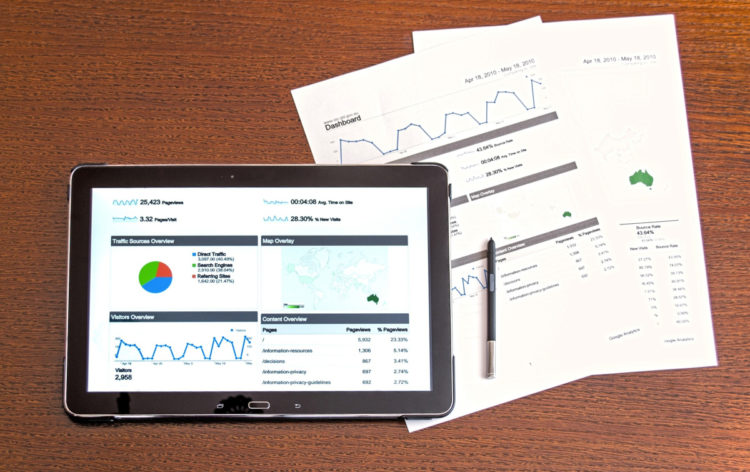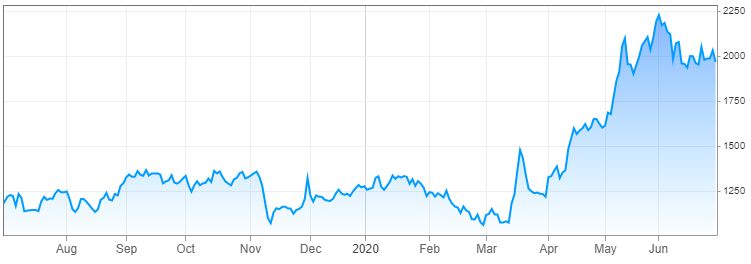Ocado Shares Fall by 3%, As they Face Correction After Recent Highs

During the Monday trading session on the London stock exchange, the Ocado PLC shares have retreated by 3%. By the end of the Friday trading session, the stock had closed at 2,033p. After today’s losses, the shares now trade at 1,969p, considerably lower than during the previous week.
Interestingly this move does not seem to come from any piece of bad news for the company. The firm did not release any results or disclose any other type of information, which might have a negative impact on its share prices.
However, the recent move might have to do with the recent extreme overvaluation of the stock. To illustrate this let us take a look at this chart:

source: cnbc.com
As we can see from the above diagram, 12 months ago the stock was trading near the 1,190p level. For several subsequent months, the shares were mostly confined within 1,200p to 1,350p without making any substantial gains or losses.
The outbreak of the COVID-19 pandemic did lead to the March 2020 stock market crash. This led to severe losses for many market participants, with some stocks losing more than half of their value in less than 4 weeks of trading. However, in the case of Ocado PLC shares, this impact was rather limited. The stock did fall back to 1,064p. However, this decline was proven to be very short-lived.
During the subsequent weeks, the stock regained all of its recent losses and made some serious gains in addition to that. At the beginning of June 2020, the shares reached an all-time high of 2,229p. By the end of the month, the stock price did moderate and now stands at 1,969p level.
Strategic Advantages of Ocado PLC
As we have seen from the above chart, instead of suffering some dramatic losses like so many other stocks, the Ocado PLC shares have benefited from recent trends and did surpass previous highs. This might be very surprising for many traders and investors. What did the company do so differently, as for its stock to stay immune to the recent downtrends in the equity markets?
The most obvious reason for this type of resilience is the fact that the company represents an online supermarket. After the outbreak of the COVID-19 pandemic, the majority of governments in the world have implemented severe lockdown measures, restricting the overall number of people who could shop for groceries in stores at the same time. This led to large lines of customers in front of the majority of supermarkets.
The United Kingdom was no exception in that regard. It goes without saying that staying and waiting in front of stores for a considerable amount of time, is not an appealing prospect for many people. Therefore, in this scenario, one attractive alternative was to purchase necessary foods, hygiene products, and other essentials on the internet. Therefore, the demand for online shopping has risen significantly. This had benefited Ocado PLC as well.
Now, here for the sake of accuracy, it is worth mentioning that there are many chains of supermarkets who do have an online shopping option as well. However, some of the stocks of those companies have not benefited as much as Ocado PLC’s shares did. Therefore, the obvious question here is: why did not those stocks also make some serious gains, due to the rise in the demand for online shopping?
Well, here we have essentially 2 things to mention. Firstly, a significant number of supermarket stocks did make some notable gains or at least fell by much less, compared to the overall stock market. Secondly, the reason why Ocado PLC’s shares have risen much higher lies in the business model of the company.
Unlike the conventional chain of stores, the firm management does not have to rent or purchase large spaces to host its customers. They do not have to hire thousands of employees to stock the shelves and assist the consumers. Those two categories make up a large portion of the expenditures for such large retailers as Tesco, Walmart, J Sainsbury’s, Morrisons, and other firms in the industry.
When it comes to the Ocado group, their management does not have to spend money on those categories. As a result, they can pass on some of their savings to customers, potentially gaining a larger market share. Also, they can also retain some portion of those sums and distribute them as dividends to shareholders.
Finally, it has to be mentioned that the effects of lockdowns can have long term implications on the retail industry as a whole. The fact that in the majority of countries, those restrictions have ended, does not necessarily mean that all consumers will return to their stores. Some of the most likely will find online shopping as a convenient alternative to going there in person. As a result of this transition, Ocado PLC is well-positioned to gain some new loyal customers.
Stock Price Overvaluation
Despite all of this good news, the stock is obviously overpriced. So far all those optimistic expectations have not been confirmed by official figures. As the CNBC suggests, the Earnings per Share (EPS) indicator of the company is still solidly into the negative territory, currently standing at -29.22p. It is likely that the management might restore the profitability of the company before the end of this year.
However, it goes without saying that the firm has to expand its earnings dramatically, in order to justify such a high price of its stock, something which is far from guaranteed. It also does not help the case that the management currently does not pay any dividends.
Therefore despite all of its advantages, it might be a good idea for investors to wait until the company recovers from recent losses and even issues some payouts to its shareholders, before investing in this stock. At the moment there are plenty of undervalued stocks where market participants can invest their money, rather than purchasing overvalued securities.


























Comments (0 comment(s))